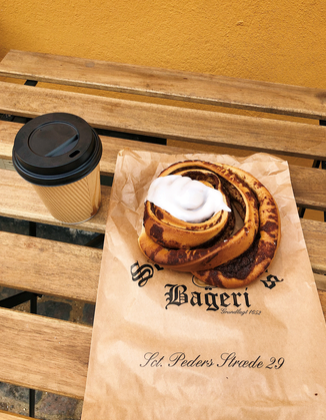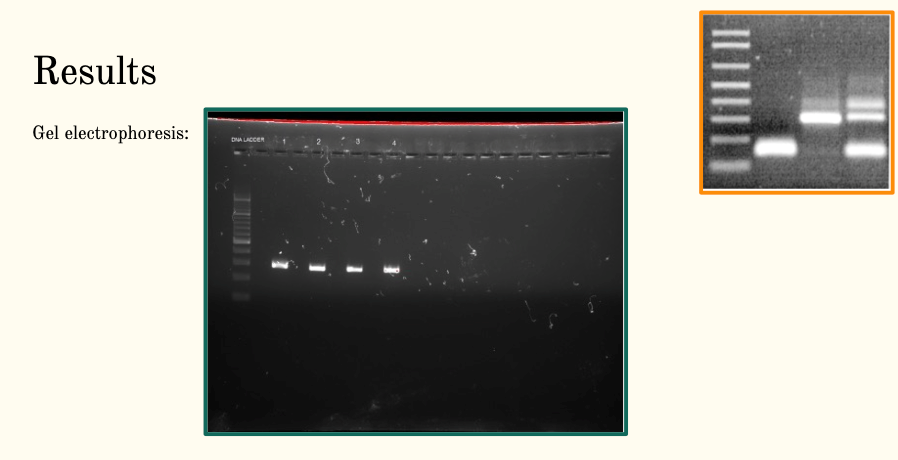Interview with Mackenzie Strobel--DIS Abroad Program, Summer 2021
by Sabrina Gilmore, Education Abroad Advisor
Mackenzie Strobel (goes by Mack) spent the summer of 2021 on the DIS Abroad (Copenhagen, Denmark & Stockholm, Sweden).
She had th
Q: What were your initial motivations for studying abroad? What drew you to the multiple sites DIS trip?

Q: Are you interested in doing future research?
A: I definitely feel more comfortable in a lab, which is usually a barrier for science . I also want to look into doing things with a CU research lab next year. I would not be as interested in doing the CU lab without the experience in Copenhagen
Q: I noticed that you have decided to do another study abroad trip this summer with a non-approved program. What will that look like? Did your research with DIS influence that at all?
A: I am going to London with the University of Evansville to participate in a program where students read research articles and then discuss them with local students and other international students. I found this program from the Instagram page of the Neuroscience club. DIS definitely influenced this decision as it made me more comfortable with scientific cultural barriers. I also think these types of programs are more exciting than regular traveling because you’re there for a purpose. You are integrating yo

A: I knew that I wanted to study abroad because I love to travel. I was kind of thrown into DIS Abroad, as it was one of the only programs that worked with my neuroscience major and I thought it was really nice that CU actually offered a summer program for such an intensive major.
Q: Did you have any specific personal, academic, or career goals in mind as you prepared for your education abroad experience?
A: There are two major paths for neuroscience majors, clinical or research. I wanted to determine which path I might be most interested in taking. Also this program helped me get research hours during the pandemic which was nearly impossible to find as hospitals didn't want outsiders in their space because of the pandemic. This opportunity gave me the option to jump-start my career.
Q: Tell me about your research project there and why you choose that topic
A: My research focused on neurodegenerative diseases. Mine specifically was on genetic manipulation of epilepsy. We took stem cells and reprogrammed them to model an eplieptic cell. Used three main methods and technology for this research; CRISPR-CAS-9, Preliminary Chain Reaction (PCR), and Gel electro paresis. CRISPR-CAS-9 technology was used to modify the gene to see whether we could induce a mutation to model exactly what is happening in the brain for more targeted drug therapy. If we could create an eplileptic model of the brain, we could use that instead of humans to test therapies. PCR allows us to amplify our genes and recreate a bunch of the desired cells. Gel electro paresis allows us to verify that we created the gene product that we were targeting. It was a really cool opportunity that allowed me to use the things I learned from classes here at CU and apply them to what I was doing. Research like this takes a long time and so even though I didn’t see any direct results yet, I felt like an important personnel that contributed to the lab
Q: Did you have any specific personal, academic, or career goals in mind as you prepared for your education abroad experience?
A: There are two major paths for neuroscience majors, clinical or research. I wanted to determine which path I might be most interested in taking. Also this program helped me get research hours during the pandemic which was nearly impossible to find as hospitals didn't want outsiders in their space because of the pandemic. This opportunity gave me the option to jump-start my career.
Q: Tell me about your research project there and why you choose that topic
A: My research focused on neurodegenerative diseases. Mine specifically was on genetic manipulation of epilepsy. We took stem cells and reprogrammed them to model an eplieptic cell. Used three main methods and technology for this research; CRISPR-CAS-9, Preliminary Chain Reaction (PCR), and Gel electro paresis. CRISPR-CAS-9 technology was used to modify the gene to see whether we could induce a mutation to model exactly what is happening in the brain for more targeted drug therapy. If we could create an eplileptic model of the brain, we could use that instead of humans to test therapies. PCR allows us to amplify our genes and recreate a bunch of the desired cells. Gel electro paresis allows us to verify that we created the gene product that we were targeting. It was a really cool opportunity that allowed me to use the things I learned from classes here at CU and apply them to what I was doing. Research like this takes a long time and so even though I didn’t see any direct results yet, I felt like an important personnel that contributed to the lab
Q: What was your biggest challenge in this study abroad experience? What was the biggest reward?
A: The biggest challenge was the difficulties in communicating back home. It was hard to stay in touch with family because of the time difference. The most rewarding part of my experience was the ability to explore the world on my own. I was required to dedicate 40 hours a week to the lab but DIS also required that I take a culture class. In this class we got to try different restaurants and learn about things like gentrification in Copenhagen. On weekends we could get together with lab mates and travel around. COVID had a lot of requirements so I didn’t get to go out of the country, but could get around our local areas.
A: The biggest challenge was the difficulties in communicating back home. It was hard to stay in touch with family because of the time difference. The most rewarding part of my experience was the ability to explore the world on my own. I was required to dedicate 40 hours a week to the lab but DIS also required that I take a culture class. In this class we got to try different restaurants and learn about things like gentrification in Copenhagen. On weekends we could get together with lab mates and travel around. COVID had a lot of requirements so I didn’t get to go out of the country, but could get around our local areas.
Q: How have you used the skills you learned abroad to help you now that you are back; either in job searching, or in other activities?
A: This experience definitely boosted my resume. It helped immensely for my medical school application. And for general conceptualization during classes. I came back and took Bio-Chem and that class would have been a lot more difficult. I was already familiar with PCR and CRISPR-CAS. Helped me a lot with everything.
Q: Share an experience where you interacted with someone in your host culture in a way that taught you something.
A: I thought it was very cool to learn the word “hygge” which only exists in Denmark. It is a part of national pride that only the Danish know what it means, and that it has no direct translation. Basically this word is the same feeling when you go to a quiet cafe and it's snowing outside and you feel comfortable and warm. I was there during the world cup and got to see nationalism everywhere. I would walk the streets and hear people call out “Denmark.” During one of the cultural classes, we saw a woman who passed out and was super sick at the park. Everyone was helping her get water in a very communal way. I learned from this there are pros and cons of living in a socialist country. People don't have to worry about paying for an ambulance or medical bill. But this also means that they are more free to make mistakes. Not as concerned with their health because the state will take care of it.
Q: Share an experience where you interacted with someone in your host culture in a way that taught you something.
A: I thought it was very cool to learn the word “hygge” which only exists in Denmark. It is a part of national pride that only the Danish know what it means, and that it has no direct translation. Basically this word is the same feeling when you go to a quiet cafe and it's snowing outside and you feel comfortable and warm. I was there during the world cup and got to see nationalism everywhere. I would walk the streets and hear people call out “Denmark.” During one of the cultural classes, we saw a woman who passed out and was super sick at the park. Everyone was helping her get water in a very communal way. I learned from this there are pros and cons of living in a socialist country. People don't have to worry about paying for an ambulance or medical bill. But this also means that they are more free to make mistakes. Not as concerned with their health because the state will take care of it.
Q: Are you interested in doing future research?
A: I definitely feel more comfortable in a lab, which is usually a barrier for science . I also want to look into doing things with a CU research lab next year. I would not be as interested in doing the CU lab without the experience in Copenhagen
Q: I noticed that you have decided to do another study abroad trip this summer with a non-approved program. What will that look like? Did your research with DIS influence that at all?
A: I am going to London with the University of Evansville to participate in a program where students read research articles and then discuss them with local students and other international students. I found this program from the Instagram page of the Neuroscience club. DIS definitely influenced this decision as it made me more comfortable with scientific cultural barriers. I also think these types of programs are more exciting than regular traveling because you’re there for a purpose. You are integrating yo
urself into workplace situations in their culture, not just touristing around.
Last Updated March 2022
